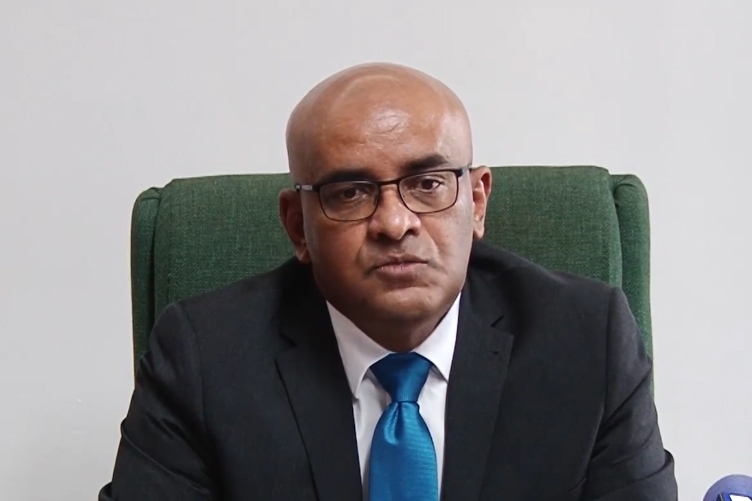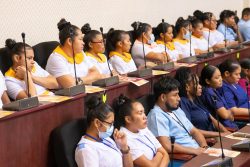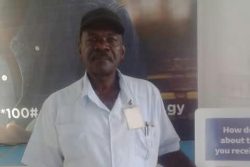Guyana’s revenue from oil and gas for at least the first five years of production will be nothing to boast about, according to Opposition Leader Bharrat Jagdeo, who says it will be sometime before the country and its people benefit from the expected wealth.
“When I hear about this rosy picture that is painted for the post 2020 period, it doesn’t accord with the reality of our finances and where we are going,” Jagdeo told attendees at the 129th Annual Awards Presentation and Gala Dinner of the Georgetown Chamber of Commerce and Industry (GCCI).
The keynote speaker at the event, Jagdeo used the occasion to criticise government’s preparation for the first five years of oil and gas production and what he said was its boasting of revenues to be earned from the emerging sector, where production is set to commence sometime in the last quarter of 2019 or the first quarter of 2020.
Jagdeo said that even in conversations that he has had with oil companies, which he did not name, the view is Guyana would not be getting revenues to make significant impacts in the lives of its people during the first five years of oil production.
“Even the oil companies, and they talk to me too, they don’t have such a rosy picture of the fortunes of Guyana and changing drastically and dramatically in the timeframe that we think it will happen. It is going to happen but not 2020 to 2025. Those will be rough years for us because US$300 million coming per year is nothing if you look at what we lost already and what US$300 million meant years ago. When oil prices were higher, at $120 US per barrel, we were paying more than US$300 million per year to pay for oil, than when it fell to $30 per barrel. Oil prices are going back up and that is the reality,” he said.
“Every speech you hear a [government] minister make now is about talking about ExxonMobil’s [discovery of] five billion barrels of oil under the sea. To get that into our economy and into our pockets, so that Guyanese and the companies benefit, and we have to create a fair environment for everyone to grow wealthier …we have to strike a balance. But to do that requires careful management of the framework,” he added.
Only recently, former United States Ambassador Perry Holloway expressed concern that Guyanese don’t grasp the magnitude of the country’s expected economic takeoff from its impending oil production and as a result are not planning accordingly. Holloway pointed to the large amount of revenue this country is expected to earn but said that planning for development was needed.
“I hear a lot of doom and gloom about a lot of things in Guyana but I understand that there are a lot of people saying, ‘We had gold, we didn’t really do much. We had bauxite we didn’t benefit that much…’ All true, but this is so much bigger than gold or bauxite or anything,” Holloway told reporters during his final meeting with the press here last week.
He reminded that while production will continue for at least three decades, citizens must bear in mind that oil is a non-renewable resource and must also make decisions for life after oil.
“This is a monstrous amount of oil and a large amount of money. You couldn’t do the math. Let’s just take a small number and say in 2025 you are producing 500,000 barrels a day, which is on the low end of the estimate. Assume it is worth US$50 a barrel—low estimate. You multiply that number of barrels and Guyana will get all the infrastructure costs paid by 2025. So Guyana will get more than half of that based on the contract. Do the math, it is a lot of money. It is a lot… about three hundred percent greater than what Guyana produces in a year now,” he said.
“So money is not going to be a problem. It is how you spend it and how you protect it and save it for the future. No one knows how long it is going to last … 20 to 30 years—I suspect it will be longer because there is more to be discovered it seems, but there will come a time when oil is not the answer. You have countries like Venezuela who had more oil than any other country in the world and people are starving. They are going through the jungle in Region One to come to Guyana. So oil is not an answer for everything if you don’t manage it wisely and know what to do with it,” he added.
‘A realistic picture’
Jagdeo said that while Guyana will reach a period of earning immense wealth, the citizenry should understand that it will not be in the near term. Moreover, he said he believed that prosperity under an APNU+AFC government would take longer to be realised and his party is “very, very, very worried” about the future.
The PPP/C’s worry, Jagdeo noted, stems from APNU+AFC failure to demonstrate that it has a sound long-term development plan for the country and it seems to be depending on oil and gas revenues instead of planning now with the resources currently at its disposal.
“Look at US$300 million in revenue income per year; that is what the government says it has now but what happens to the jobs? 1,000 [jobs] in the oil and gas sector but we have lost 30,000 already. So where are the efforts to create jobs?” he asked.
“If we use some [of the US$300 million to save for the debt, some to save for inter-generational equity , some for macroeconomic purposes and some on infrastructure, then that is it. It is gone. If we use that [it] is gone. How does it change everything else? That is what we ourselves we have to ask or we will be grossly disappointed and we will start complaining again. We have to have a realistic picture. They are setting us up for long term or medium term problems. Look at the numbers, be guided by the numbers, not the anecdote; not the talk; not the enthusiasm,” he added.
He said that instead of talking about the money to be garnered, government should show the people short-, medium- and long-term plans for the various periods of production.
“We have a government who cannot up to today say if future blocks will be auctioned or given out quietly. They need a consultant to tell us that. We have a government that comes and talks about oil and gas everywhere and can’t answer simple questions. What will be the Terms of Reference of the Department of Energy versus the Petroleum Commission? Which will be the technical agency? How will they overlap? Who will make critical decisions? That is all complicated by a letter [from] the president saying only my ministry will deal with these issues and that will determine the pace of development. What does that mean when [ExxonMobil] is planning to move to the second phase and the Office of the President [Ministry of the Presidency] is not ready to make critical decisions? It slows down the investment yet we are talking about this massive potential,” Jagdeo added.
Turning to the proposed Natural Resource Fund, Jagdeo continued criticising the government. “You can claim Santiago Principles, that it satisfied 21 of them and you can talk about all the other things … but the key issue for us about the role of government and the extent that the government will reach into the management at this point. The Ministry of Finance has an overwhelming influence over Central Bank, which will be in charge of the fund, the macro-committee and the investment committee. The arm’s length management of these funds, that is what… we are advocating,” he added.
Jagdeo further said that it is not that he or his party want to be negative but that government has not given the people much to hope for. “In five months’ time we will enter into the fifth year of this government and until now they have not crafted a strategy or settled into strategy and yet we are talking post-2020,” he added.









